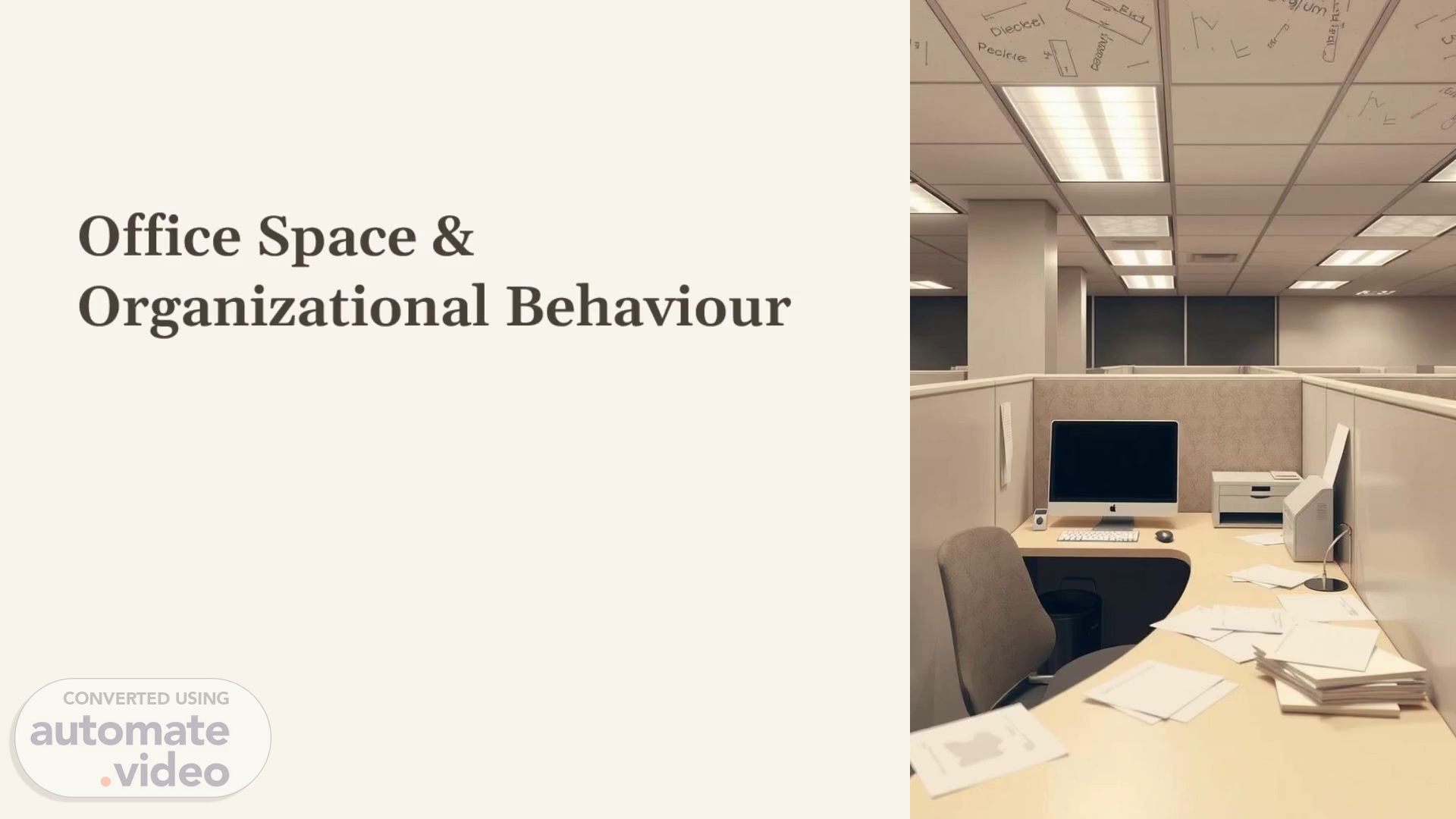Scene 1 (0s)
[Audio] The film is a living case study that explores the human side of organizations, revealing universal issues such as boredom, red tape, and burnout that plague many workplaces worldwide. Its portrayal of employees navigating and rebelling against corporate absurdities provides a nuanced understanding of organizational behavior..
Scene 2 (19s)
[Audio] The film is famous for its hilarious take on office life, especially the epic printer-smashing moment that resonates with anyone who's faced pointless tech frustrations. Beyond laughter, it reveals universal issues of boredom, red tape, and burnout that plague many organizations worldwide.
Scene 3 (37s)
[Audio] Organizational Behaviour is a multidisciplinary field that examines various aspects of organisational life. It focuses on understanding individual, group, and organisational levels of analysis. The individual level looks at how employees think, feel, and behave within their work environment, including factors such as attitudes, motivation, and job satisfaction. The group level explores team dynamics, communication patterns, and conflict resolution among members. The organisational level examines the broader cultural, structural, and leadership influences that shape the overall functioning of the organisation. By considering these different levels, we gain a deeper understanding of the complex interplay between individuals, teams, and the organisation as a whole..
Scene 4 (1m 25s)
[Audio] Peter's journey demonstrates how eliminating worries enables him to concentrate on autonomy and meaningful work, resulting in enhanced productivity and authenticity. This phenomenon supports Herzberg's theory, which posits that hygienes prevent dissatisfaction while motivators drive satisfaction. By emphasizing intrinsic motivation over extrinsic factors, Peter accomplishes superior performance..
Scene 5 (1m 50s)
[Audio] Bill Lumbergh's leadership style is characterized by his focus on rules, supervision, and rewards or punishments. He prioritizes control over trust, which often leads to low employee morale and creativity. His approach lacks inspiration and empowerment, resulting in a transactional leadership style..
Scene 6 (2m 10s)
[Audio] Communication breakdowns can occur when there is a lack of clear channels for communication. Pointless meetings can result from this, as individuals feel they are wasting their time. Vague memos can also cause confusion and increase disengagement among team members. To overcome these challenges, it is essential to establish timely feedback mechanisms and practice active listening. By doing so, we can ensure that our communication is effective and aligns with our goals..
Scene 7 (2m 38s)
[Audio] In many organizations, informal networks facilitate change by forming outside traditional hierarchies, enabling idea sharing and collaboration on initiatives not possible through formal channels. The story of Peter, Samir, and Michael shows this, as they united despite department differences to challenge company norms, exemplifying group cohesion's power in driving change. By leveraging informal networks, organizations can create a sense of community and momentum around change efforts, increasing their likelihood of success..
Scene 8 (3m 11s)
[Audio] In many organizations, symbols and artifacts significantly shape the culture and climate. Malfunctioning printers or stolen staplers often reflect the deeper values and norms existing within the organization. At Initech, teamwork is emphasized, yet the reward system prioritizes compliance over collaboration, creating a culture of blind obedience. The daily experience of working at Initech is influenced by these contradictions, making it challenging for employees to feel engaged and motivated. Recognizing the importance of symbols and artifacts in organizational culture helps us understand how they impact our behavior and attitudes towards work..
Scene 9 (3m 52s)
[Audio] When employees feel devalued, their sense of belonging and connection to the organization is broken. This breach of the psychological contract can lead to disengagement, resentment, and even retaliation. It's essential to recognize the importance of well-being in the workplace, as it has a direct impact on job satisfaction and overall performance. By honoring the psychological contract, organizations can foster a positive and supportive environment, leading to increased motivation and reduced burnout..
Scene 10 (4m 23s)
Thank you for listening.
